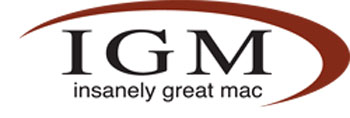OS X v. Linux: Just Not "Getting It"
November 4th 2002
OS X is clearly causing some paranoia in certain sections of the Linux community - and it needn't be so, as both Linux and OS X have much in common - including a common foe.
IGM recently critiqued Timothy Butler's comments on OS X v. Linux. Unfortunately, Mr. Butler is coming across as an anti-OS X Linux zealot, rather than an impartial advocate of the Linux platform, in his latest column.
To begin with, Mr. Butler argues that rebuttals to his article [including mine] focused upon "specialty applications", such as Photoshop, Final Cut and Quark. This is selective at best, and misleading at worst. MS's Office was also considered a mission-critical app. Yes, there is OpenOffice and Crossover Office for Linux, but it's Mr. Butler here who's missing the point: AppleWorks opens Office files as well: but that doesn't mean everyone uses it [and yes, there's a Windows version of AppleWorks for education].
And Photoshop is not a 'specialty' application these days. And InDesign [and Pagemaker on OS 9] are standard fare for anyone who publishes a newsletter, a book or a magazine. If Mr. Butler thinks that all people do on their 'puters now is type, he's also probably not aware that MS-DOS 5.0 has fancy new menus now.
A key point Mr. Butler misses, which IGM's OS X specialist, Derek Currie, mentioned in his comments, went directly to the crux of the matter:
"Plug and play."
If the "average user" is Mr. Butler's Linux target market (as he claims), then you can imagine how they'd react if drivers weren't available for their CDRW. Or scanner.
Take a trip down to, say, Yamaha, one of the best supporters of Mac firmware on their CDRWs. Will you find a Linux flash utility? No. And you might damage the EPROM on the burner if you try to do it under emulation.
Do a search for flashing CDRWs from Linux. One of the gems I got about burning via SCSI included this tale of woe:
"Irratic [sic] behavour followed by kernel-panic occured almost every attempt to burn CDs. Changing the BIOS-settings to 10 and disable wide negotiation proved successful on both adapters."
Run that past your "average user".
Or you could simply plug a SCSI burner into any Mac built since 1988. Or any Mac with a SCSI card that didn't ship with SCSI on the mobo.
Not content with an absence of firmware upgrades, Mr. Butler ploughs on regardless:
"In fact, if you are coming from a Windows background, Linux is arranged in a much more natural manor than the Mac interface is. Even though it looks a bit different than Windows, it works pretty much the same, thus providing a sizably lower learning curve than Mac OS."
The mind boggles at the monumental stupidity of such a statement. I can plunk virtually any 'Doze droid or OS 9 grandmother in front of OS X, and everything is pretty easy to figure out [although adding FruitMenu or ClassicMenu should be on your To Do list].
But for Mr. Butler to claim that "Linux is arranged in a much more natural manor than the Mac interface is" merely propagates his orrery of errors. [Memo to Mr. Butler: a manor is either a large country house, or a medieval manor-house surrounded by peasants who work for free most days of the year. We'll assume that definition wasn't his intention].
Back to OS X: One menu bar. One hard drive. Pop in an audio CD and iTunes opens. Insert a blank CD and DiskBurner gets going. Plug in your digicam and iPhoto launches. Double click on a PDF. Preview opens it. You didn't even need to install Acrobat Reader. Not hard.
[As an aside, I'd add that OS X has interface inconsistencies which make it inferior to OS 9 at this point; Apple would do well to push for a forceful rearticulation of its interface guidelines, but at least Quit is still Cmd-Q and close window is Cmd-W]
I have nothing against Linux. It is undeniable that it runs on very cheap hardware and the OS itself is free or inexpensive. However, we don't happen to feel it's ready for prime time as a desktop system for average users. Not in comparison to the alternative Unix anyway.
But if I'm not mistaken, "average users" do not want to comb the web hunting for drivers, adds on and all sorts of other paraphernalia. This is why Apple "gets it". That eMac, iBook or iMac comes as a complete package. It's always been the case. You don't need specialized drivers for FireWire, USB add-on cards or Ethernet 100bT cards. You don't need to upgrade the BIOS to get a piece of hardware to work.
We'll leave Mr. Butler hoist by his own petard:
"Why switch to Mac OS X to use an unstable office suite [He's referring to OpenOffice for OS X - ed.] that doesn't work like the rest of the environment, when you can get a stable version for Linux that works just like other Linux applications."
Methinks Mr. Butler protesteth too much. What do you think?
